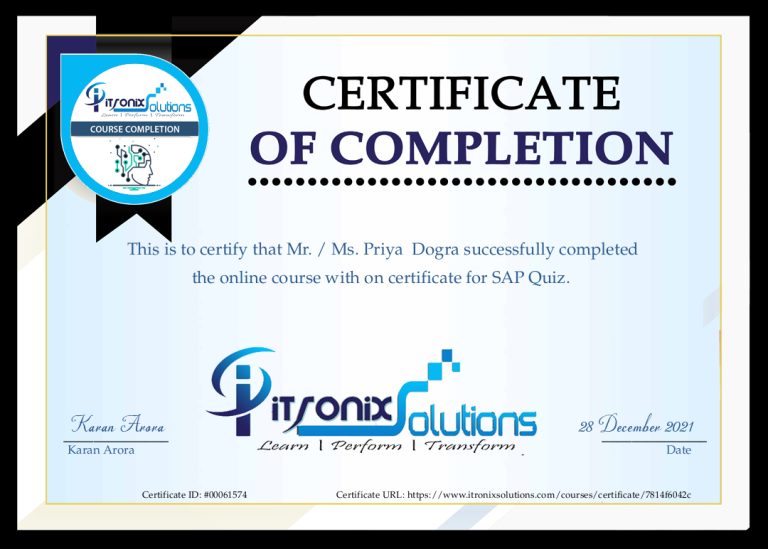SAP systems are critical to business functions and operations, regardless of the size of the company. A SAP certificate opens up various job opportunities. Detailed knowledge of SAP courses and modules can help you make the right career decisions. In this article, we will cover what a SAP course is, examine the types of SAP modules and certification levels, and discuss the benefits of a SAP course, SAP certification cost and some of the job opportunities.
What is an SAP course?
SAP certifications are becoming highly valuable for employees and companies as SAP is adding new applications, tools and interfaces in almost every area of business management. You can earn this certificate as part of your degree or as a standalone course. The SAP course consists of various modules right from basic to technical types, covering almost all elements of business management.
It offers the ability to manage the SAP design business, including setting up organizational structures, advanced solutions, and more. SAP certified professionals can create data warehouses, make input masks, and manage information.
SAP courses typically cover the following areas:
- Billing
- SAP Software as a Service (SaaS) Solution Management
- Inventory and Shipping Process
- Data Warehouses
- Product Management
- Database Management
- Business Scenarios and Procedures
SAP stands for system, application and product. SAP software can head various business elements, which include operations, finance, facilities and human resources. ERP (Enterprise Resource Planning) software is an important functionality of SAP software. It enables aggregation and analysis of data in other domains like business intelligence as well as customer relationship management.
SAP Modules: Types –
Two SAP modules usually consist of several submodules. Below are those two modules:
Functional Modules:
SAP provides various standard functions that companies can use to perform various operations. Function modules offer standard functions to seamlessly execute real business activities. The SAP functional module basically aims at customer relationship management, finance management, sales, business objects, business intelligence, distribution and supply chain management.
Below is a list of functional modules:
- SAP project system (PS)
- SAP human resources management (HRM)
- SAP quality management (QM)
- SAP plant maintenance (PM)
- SAP production planning (PP)
- SAP Sales and distribution (SD)
- SAP logistics execution (LE)
- SAP Controlling (CO)
- SAP materials management (MM)
- SAP financial accounting (FI)
- SAP financial supply chain management (FSCM)
The technical module mainly focuses on programming and customizing the module with SAP. This SAP modules allow professionals to perform tasks, develop applications, schedule tasks, download and configure updates, and troubleshoot migration management and implementation. This technical module includes:
- SAP Solution Manager (SAP SM)
- Customer Relationship Management (SAP CRM)
- Exchange Infrastructure (SAP XI)
- SAP NetWeaver
- High Performance Analytic Appliance (SAP HANA)
- Information Systems Management (SAP IS)
- Advanced Business Application Programming (ABAP)
- SAP Basis
- SAP Security
SAP Course Level:
The SAP course offers multi-level certifications that mainly focus on a specific topic. The four main levels of SAP certification are:
Associate Certification:
This is a basic level certification. The associate certificate covers the fundamental needs of SAP professionals. If you want to understand more about SAP and get a higher certification, you can start from this level. The Associate-level certification exam is three hours long and typically consists of eighty multiple-choice questions.
Delta Certification:
Delta certification is based on an associate-level qualification. It releases functionalities and is updated every three months. The Delta Certification evaluation is based on new features and editions for improvement for the quarter, and certified professionals must be on it to meet the new Delta standards. The exam lasts ninety minutes and consists of forty questions. This exam aims to inform professionals with the latest SAP skills and information.
Specialist Certification:
Specific certifications focus on a specific topic or component of SAP integration and provide professionals with very narrow and specific business knowledge. The specialist certification exam lasts 90 minutes. Only those who have successfully passed the related certification exam can take this exam.
Professional certification:
Professional Certification is the highest level of SAP certification. Requires real project experience, solid business knowledge, in-depth understanding of SAP solutions and advanced SAP tools knowledge before the exam. Professional certifications can give you the opportunity to make more money and advance significantly in your career.


